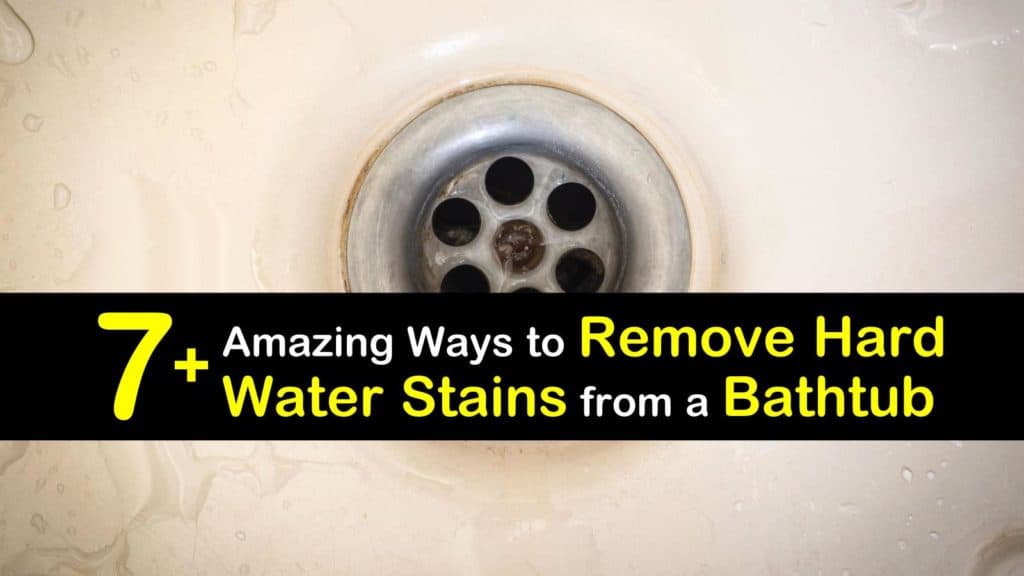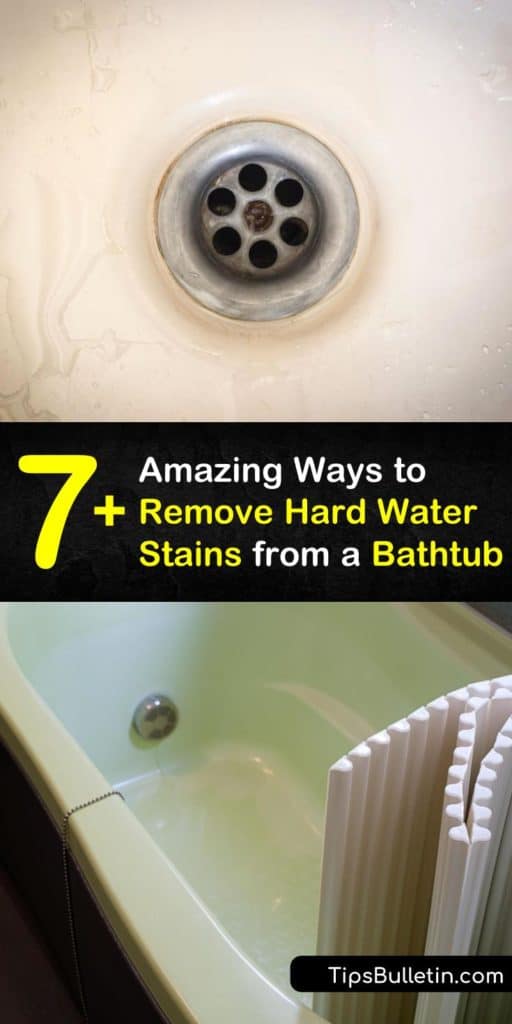How To Remove Well Water Stains From Tub
Observe out how to remove hard h2o stains from a bathtub speedily and hands with our simple cleaning tips. They don't require harsh chemicals or bleach, and then balance assured that you, your family unit, and the environs are safe.
Chances are, you have well-nigh of these items at home already. Try one of our recipes to find the ideal cleaning solution for your household.
Have you noticed cruddy stains on your bathtub, toilet bowl, and other water fixtures? Does a cloudy film coat your shower curtains or glass shower doors?
If so, you're probably i of the 85 percent of households across the country with difficult water. But don't worry, in that location are numerous like shooting fish in a barrel cleaning methods for removing hard water stains and calcium deposits from bathtub.

- Easy Ways to Remove Hard Water Stains from a Bathtub
- Mix Vinegar With Water
- Add Dish Soap to Vinegar Spray
- Mix Lemon Juice with Water
- Add Lemon Essential Oil to H2o
- Mix Hydrogen Peroxide with Water
- Make a Cleansing Scrub with Baking Soda and Vinegar
- Make a Cleansing Scrub with Foam of Tartar and Vinegar
- Erase Calcium Deposits from Bathtub and Drinking glass Shower Doors
- Add Vinegar to Regular Cleaning Products
- Remove Calcium Deposits from Bathtub and Faucets with Toothpaste
- How to Prevent Hard Water Stains
- What Causes Hard Water Stains?
- How to Remove Hard Water Stains from a Bathtub
Easy Ways to Remove Hard Water Stains from a Bathtub
If you call back back to science courses at schoolhouse, you'll retrieve that acrid neutralizes a base of operations. Mineral deposits are alkaline metal, so you need to use an acid to dissolve them.
White vinegar, apple tree cider vinegar, hydrogen peroxide, and lemon juice are all mild acids and natural disinfectants that are effective and condom to utilise at home. Here are easy DIY recipes for means to remove difficult water stains from a bathtub.
Endeavour one of our recipes for the all-time homemade bathtub cleaner and use these elementary cleaning methods for removing stubborn hard water stains.
tb1234
Mix Vinegar With Water
Vinegar is a powerful cleanser for removing hard h2o stains that is safe to utilize on fiberglass or metal. Clean hard water stains from a plastic bathtub with information technology, as well. Since it'due south acidic, vinegar dissolves mineral deposits and disinfects surfaces at the same time.
tb1234
Combine equal parts white vinegar or apple tree cider vinegar and water in a make clean spray canteen and spray surfaces thoroughly.
Leave it to sit for a minimum of 15 minutes to let the acrid in the vinegar to dissolve the mineral deposits. Wipe the tub clean with a dry microfiber towel.
Add Dish Soap to Vinegar Spray
Adding dish lather to the vinegar spray helps lift stubborn hard water deposits and prevents them from reattaching to the bathtub.
tb1234
Add a pocket-sized eject of dish soap to the vinegar spray recipe above to remove hair dye from a bathtub or eliminate difficult water stains. Spray surfaces thoroughly, and scrub tough stains with a sponge or paper towels.
Mix Lemon Juice with Water
Citric acid is effective at cleaning difficult h2o deposits. Lemon and lime juice have similar amounts of citric acid, although lemon juice is slightly stronger.
tb1234
Combine ii parts lemon juice and one part h2o in a spray canteen and spray surfaces thoroughly. Permit information technology soak for a minimum of 15 minutes, and then wipe make clean with a dry microfiber towel.
Add together Lemon Essential Oil to Water
In addition to the citric acrid, using lemon essential oil has the extra benefit of preventing time to come difficult water stains considering the oil prevents minerals from attaching to surfaces.
tb1234
Add together lemon oil to the water, swirl the mixture for a few seconds to blend, and and so follow the lemon juice spray'southward instructions.
Mix Hydrogen Peroxide with Water
Hydrogen peroxide is a natural substitute for bleach and works wonders to clean hard water stains from fiberglass bathtub.
tb1234
Combine equal parts hydrogen peroxide and water in a spray bottle, then follow the instructions for the vinegar spray.
Make a Cleansing Scrub with Baking Soda and Vinegar
Baking soda is a natural scrubbing agent that lifts stubborn hard h2o stains without scratching your bathtub. Borax is a skilful alternative for similar results. You can also try this uncomplicated solution to remove hard water deposits from toilet bowl.
tb1234
To make clean calcium buildup in a toilet basin or the tub and shower, add vinegar to the baking soda and mix until it forms a paste similar to cake frosting. Spread the paste evenly over stains and let it sit for 15 minutes.
Scrub with a non-abrasive sponge or brush, rinse with warm water and wipe clean with a dry microfiber towel. Use an old toothbrush as an eraser for difficult-to-reach places like the faucet, shower head, and drain.
Make a Cleansing Scrub with Foam of Tartar and Vinegar
Cream of tartar has the added perk of making vinegar more than acidic to remove calcium deposits from bathtub fifty-fifty better.
tb1234
Mix and apply the paste following the instructions above to remove stains from glass shower doors, your tub or toilet, and erase your nigh stubborn difficult h2o stains.
Erase Calcium Deposits from Bathtub and Drinking glass Shower Doors
By using coconut oil mixed with lemon and peppermint essential oils, you not only go your bathtub and drinking glass shower doors sparkling over again but also foreclose hereafter mineral buildup.
tb1234
Spread the coconut oil evenly over surfaces and allow it sit for at least xv minutes. Scrub grime and soap scum, and remove limescale using a soft-bristled brush. Use paper or microfiber towels to wipe away excess oil, then vitrify with a new towel.
Add Vinegar to Regular Cleaning Products
The acidity of vinegar volition give your bathroom cleaner an extra boost for erasing stubborn hard h2o stains without compromising their disinfectant power.
Ammonia provides a similar event, but it's crucial to never add ammonia to cleaning products containing bleach for safety reasons.
Remove Calcium Deposits from Bathtub and Faucets with Toothpaste
Toothpaste works wonders to remove difficult water stains, especially on glass shower doors and metallic fixtures like the faucet, drain, and shower head. It's a mild annoying that won't scratch surfaces.
Squirt a small amount onto an erstwhile toothbrush, sponge, or cloth and scrub the stain. Apply a moisture sponge or fabric to wipe away the toothpaste, so dry with a microfiber towel or a duster.
How to Forestall Hard Water Stains
To permanently eliminate hard water, y'all demand to install a water softener that will remove minerals from the water before it flows through your pipes. The average toll of installing a h2o softener is $800 and upward.
tb1234
What Causes Difficult Water Stains?
Hard h2o stains occur when h2o containing high amounts of alkaline minerals similar calcium, magnesium, manganese, and fe evaporate. These minerals build up and crusade discoloration or stains.
Calcium deposits mainly crusade chalky white residue or limescale. Dark brown or black stains are a consequence of loftier levels of manganese in the water. Iron causes orange, rusty colored stains.
While hard water isn't a health hazard, it clogs your pipes and reduces the efficiency of h2o-using appliances like water heaters, dishwashers, and washing machines.
Hard h2o deposits shorten the working lifespan of your appliances by up to 50 pct. Over time, the minerals can besides eat abroad at plumbing and cause small leaks.
tb1234
How to Remove Hard Water Stains from a Bathtub
tb1234
Nosotros hope you lot enjoyed reading nigh these recipes for homemade cleaning products and how to remove hard water stains from a bathtub.

If y'all found these bathtub cleaning tips helpful, please share this article near uncomplicated means to remove hard water stains from a bathtub with your friends and family on Pinterest and Facebook.
How To Remove Well Water Stains From Tub,
Source: https://www.tipsbulletin.com/how-to-remove-hard-water-stains-from-a-bathtub/
Posted by: sullivanrefereall.blogspot.com


0 Response to "How To Remove Well Water Stains From Tub"
Post a Comment